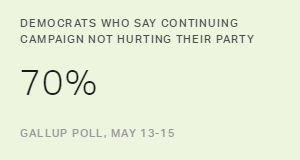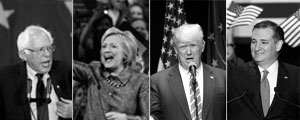Story Highlights
- 70% say campaign is not damaging party
- Sanders, Clinton supporters about as likely to hold this view
- There is agreement across age groups
WASHINGTON, D.C. -- Although Bernie Sanders has scored a series of victories in recent primaries to slow down Hillary Clinton's likely presidential nomination, the vast majority of Democrats (70%) do not think the continuing campaign for the Democratic nomination is hurting the party. Sanders and Clinton supporters share this sentiment, and Democrats' views are unchanged from last month (71%).
| Hurting the party% | Not hurting the party% | ||||||||||||||||||||||||||||||||||||||||||||||||||||||||||||||||||||||||||||||||||||||||||||||||||
|---|---|---|---|---|---|---|---|---|---|---|---|---|---|---|---|---|---|---|---|---|---|---|---|---|---|---|---|---|---|---|---|---|---|---|---|---|---|---|---|---|---|---|---|---|---|---|---|---|---|---|---|---|---|---|---|---|---|---|---|---|---|---|---|---|---|---|---|---|---|---|---|---|---|---|---|---|---|---|---|---|---|---|---|---|---|---|---|---|---|---|---|---|---|---|---|---|---|---|---|
| Democrats/Democratic-leaning independents | 25 | 70 | |||||||||||||||||||||||||||||||||||||||||||||||||||||||||||||||||||||||||||||||||||||||||||||||||
| Clinton supporters | 23 | 74 | |||||||||||||||||||||||||||||||||||||||||||||||||||||||||||||||||||||||||||||||||||||||||||||||||
| Sanders supporters | 27 | 69 | |||||||||||||||||||||||||||||||||||||||||||||||||||||||||||||||||||||||||||||||||||||||||||||||||
| Gallup, May 13-15, 2016 | |||||||||||||||||||||||||||||||||||||||||||||||||||||||||||||||||||||||||||||||||||||||||||||||||||
Meanwhile, one in four Democrats do believe the process has damaged the party. This perception of party damage is much lower than what Gallup measured among Republicans last month. In April, before Ted Cruz and John Kasich suspended their campaigns, a majority (63%) of Republicans and Republican-leaning independents said they thought their party's continuing campaign for the nomination was hurting the party. That may have reflected the antipathy between Donald Trump and his Republican opponents in the race, as well as widespread speculation at the time that the party was headed for a brokered convention.
The latest data, collected May 13-15, come as a dispute at the state Democratic convention in Nevada has angered Sanders' supporters. They alleged corruption in the vote for the state-level delegates, as some of them booed and later sent threatening messages to the party official tasked with leading the convention.
Accusations that the party establishment has snubbed Sanders in favor of Clinton are not new, and date back to early in the nomination process. Last year, Sanders accused the party of scheduling debates during times of low viewership as a way to protect Clinton's candidacy. But the fallout from the events surrounding the Nevada Democratic convention underscores how difficult unifying the party after the nomination process could be.
Across Age Groups, Democrats Agree That Continuing Campaign Not Hurting Party
As of this recent poll, concluded Sunday, rank-and-file Democrats do not perceive the continuing campaign as having harmed their party. The process is coming to a close, as Clinton is fewer than 100 delegates away from clinching the nomination, with fewer than a dozen primaries left.
Age-wise, Democrats are on the same page about the nomination process' impact on the party. About one in four younger Democrats, who skew toward Sanders, and older Democrats, who lean toward Clinton, say the process is damaging the party, while majorities of each age group say the campaign isn't harming it.
| Hurting the party% | Not hurting the party% | ||||||||||||||||||||||||||||||||||||||||||||||||||||||||||||||||||||||||||||||||||||||||||||||||||
|---|---|---|---|---|---|---|---|---|---|---|---|---|---|---|---|---|---|---|---|---|---|---|---|---|---|---|---|---|---|---|---|---|---|---|---|---|---|---|---|---|---|---|---|---|---|---|---|---|---|---|---|---|---|---|---|---|---|---|---|---|---|---|---|---|---|---|---|---|---|---|---|---|---|---|---|---|---|---|---|---|---|---|---|---|---|---|---|---|---|---|---|---|---|---|---|---|---|---|---|
| 18 to 29 | 25 | 71 | |||||||||||||||||||||||||||||||||||||||||||||||||||||||||||||||||||||||||||||||||||||||||||||||||
| 30 to 49 | 25 | 70 | |||||||||||||||||||||||||||||||||||||||||||||||||||||||||||||||||||||||||||||||||||||||||||||||||
| 50 to 64 | 25 | 68 | |||||||||||||||||||||||||||||||||||||||||||||||||||||||||||||||||||||||||||||||||||||||||||||||||
| 65+ | 23 | 73 | |||||||||||||||||||||||||||||||||||||||||||||||||||||||||||||||||||||||||||||||||||||||||||||||||
| Gallup, May 13-15, 2016 | |||||||||||||||||||||||||||||||||||||||||||||||||||||||||||||||||||||||||||||||||||||||||||||||||||
Bottom Line
Though tensions have boiled over recently, the dramatic events are not representative of the feelings of rank-and-file Democrats, who don't share with Republicans the view that a continuing campaign for their party's nomination is damaging the party itself. Republicans' more pessimistic views could stem from a long process that has involved a large group of candidates, name-calling and many heated, televised exchanges. While the Democratic candidates have had impassioned exchanges of their own, the temperament of the contest pales in comparison to that of the GOP.
Regardless, the process is almost over, as Clinton nears the required delegate threshold for the Democratic nomination and few contests remain -- though Clinton's total delegate count includes many superdelegates, who can theoretically redirect their support to Sanders. But the larger challenge for the eventual nominee may not be how damaging the process has been, but whether he or she can unify the party in time to defeat presumed Republican nominee Trump. Democrats' current view that the process has been harmless could bode well for the party if, after the convention, supporters of the losing candidate continue to feel this way.
Survey Methods
Results for this Gallup poll are based on telephone interviews conducted May 13-15, 2016, on the Gallup U.S. Daily survey, with a random sample of 699 Democrats and Democratic-leaning independents, aged 18 and older, living in all 50 U.S. states and the District of Columbia. For results based on the total sample of national adults, the margin of sampling error is ±5 percentage points at the 95% confidence level. All reported margins of sampling error include computed design effects for weighting.
Each sample of national adults includes a minimum quota of 60% cellphone respondents and 40% landline respondents, with additional minimum quotas by time zone within region. Landline and cellular telephone numbers are selected using random-digit-dial methods.
View survey methodology, complete question responses and trends.
Learn more about how the Gallup U.S. Daily works.




